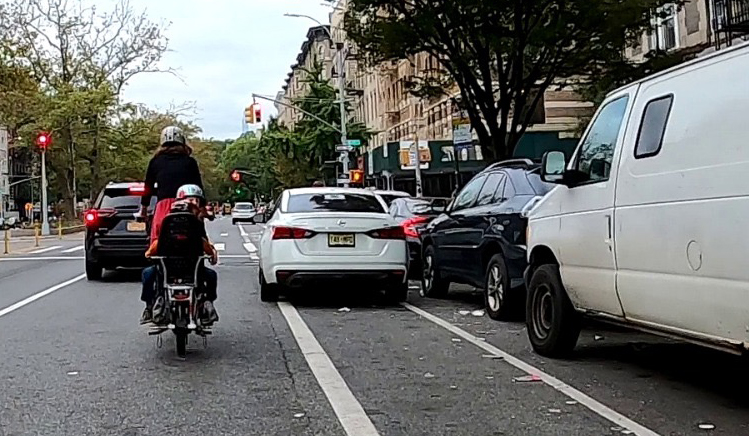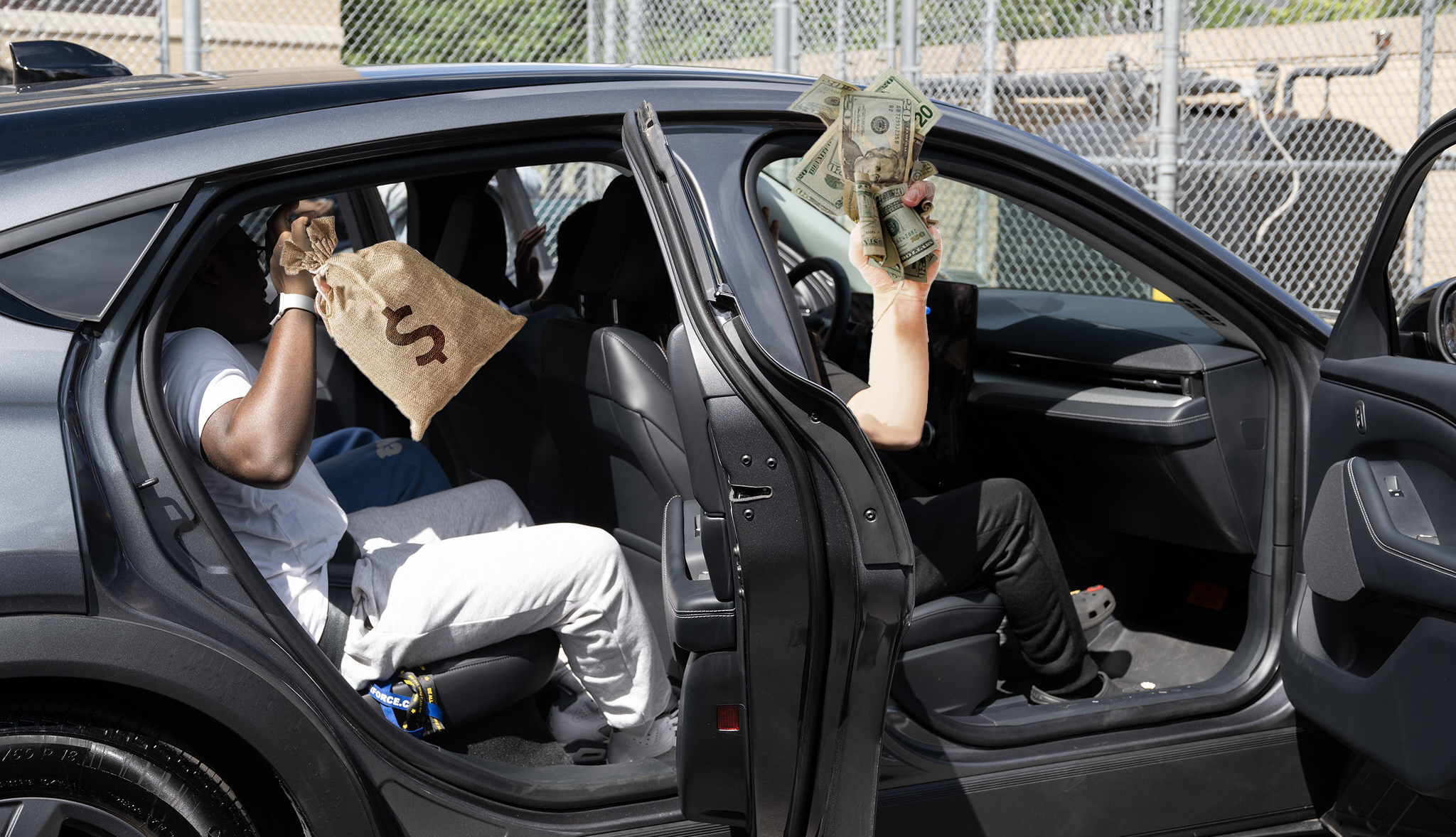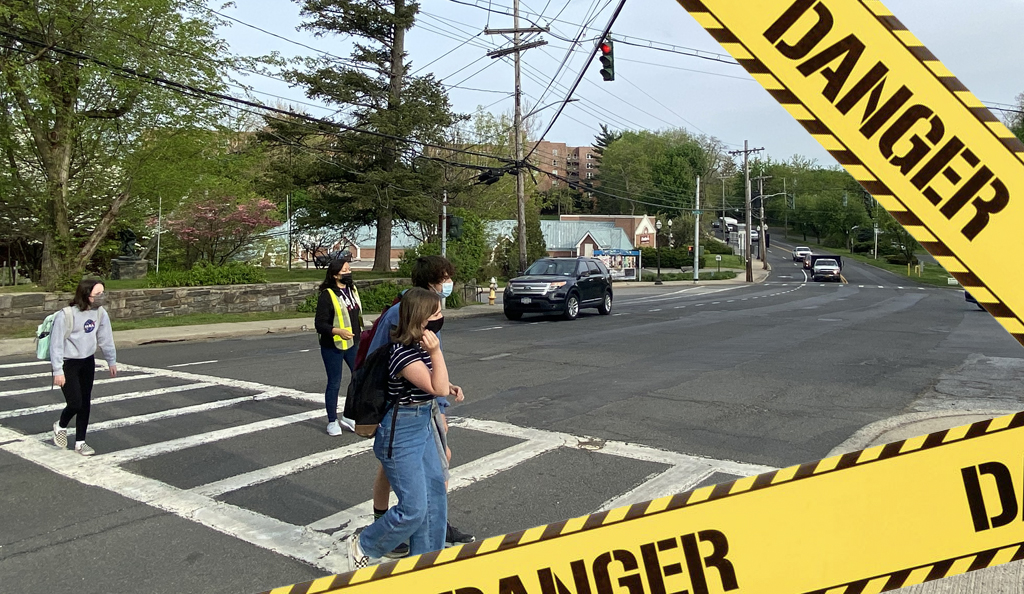A long-stalled bill that would allow people to report drivers who block bike or bus lanes is about to move forward in the City Council, but without its central feature: people who make complaints will no longer receive 25 percent of the resulting ticket revenue.
Council Member Lincoln Restler’s Intro 501 now appears on the Council website in revised form, an indication that the bill’s 28 supporters and Council leadership have ended their negotiations in compromise — the biggest one appearing to be the removal of the 25 percent award from the $175 ticket. The bill will also be phased in, geographically, over three years.
A majority of the Council supported the bill before the changes, so it is unclear what will happen now. Other changes to the bill are also profound — sometimes in ways that supporters will cheer, other times in ways that seek to address opponents’ concerns.
- The revised bill adds a new section that will either reduce the number of complaints or ensure that the complaints are properly written. The new language requires the Department of Transportation to create a “digital training course” that would-be complainants must first complete “before they are eligible to file such a complaint.” And those people must have “a New York state driver’s license, a New York state non-driver identification card, or a New York city identity card.”
- The revised bill allows only complaints in Lower Manhattan (Community Board 1) and Downtown Brooklyn (Community Board 2) in the first year that it takes effect. In the second year, the area in which complaints could be lodge would expand to all of Manhattan plus Brooklyn community districts 1, 3, 4, 6, 7, 8 and 9, Queens community district 1, 2 and 3, and Bronx community district 1. (A map of community districts is here.) By year three, the entire city would be covered.
- In the new bill, the DOT would be require to “install signage in any area where civilian complaints … may be filed,” though it is unclear how extensive that signage will be.
- The revised bill requires that the car be “unoccupied” when a report is filed, a change that is aimed at avoiding conflict.
- The revised bill requires the DOT to create a mobile app for citizen reporting.
On the plus side for bill supporters, the law will now cover a much broader swath of the city. The original bill only allowed for citizen reporting within 1,320 feet of a school building. That zone has been doubled to 2,640 feet, which given the locations of schools, covers almost the entire city.
In a statement, Restler said the “updated version of this bill will prioritize safety by reducing the likelihood of conflict between neighbors while continuing to empower citizen enforcement across nearly the entirety of New York City.”
He thanked Transportation Committee Chair Selvena Brooks-Powers “for her leadership in providing a forum to hear this critical bill,” and did not address the loss of the 25-percent bounty, which supporters long said provided a key incentive for people to participate. That provision was modeled on existing city law that kicks back 25 percent of ticket revenue from commercial idling that’s reported by residents.
“We need to pass Intro 501-A to reduce traffic violence and unsafe conditions on our streets,” Restler said.
It was immediately unclear whether it was Brooks-Powers or Council Speaker Adrienne Adams who demanded the significant changes in the bill, though both had previously expressed concern over conflict between drivers and the people seeking to profit from their malfeasance in dangerously blocking bike and bus lanes.
Restler said his bill was designed to make roadways safer, not to enrich complainants.
“I think the idling program has worked well and we should expand this model,” he said. “As it relates to 501, my top priority is expanding street safety and I believe empowering New Yorkers to submit violations for unsafe parking conditions in bike lanes, bus lanes and on sidewalks will make a major difference in bringing real accountability and changing behavior of bad actors.
“Our legislation requires creation of an app to allow for seamless filing of complaints for illegal parking behavior — unlike the clunky idling program,” he added. “I believe a simple training course on how to correctly capture and submit violations and deescalate potential issues with neighbors will make improve overall efficacy.”
Transportation Alternatives did not think the loss of the bounty was a big deal — so long as tickets are issued properly.
“Blocked bus lanes, bike lanes, and crosswalks make our streets dangerous and inaccessible to so many New Yorkers. We need legislative solutions like Intro 501 when city leaders fail to implement any accountability measures to keep our streets safe and clear,” said Elizabeth Adams, the group’s senior sirector of Advocacy & Organizing. “Any changes to the bill need to include measures that ensure violations are actually addressed. The city could keep blocked streets clear today — the fact that they don’t is why civilian enforcement is needed at all.”
And Jon Orcutt of Bike New York was also not deterred.
“It’s fantastic news that the citizen parking enforcement measure looks like it’s moving ahead,” he said. “It’s great that Council leadership and the Adams administration acknowledge that the scourge of blatantly illegal parking needs to be rolled back. … I know some will be disappointed by removal of the ‘bounty,’ but that’s actually something that would have provided constant political ammunition for the drive-or-die and parking corruption crowds. Of course it would be far better if city law enforcement was up to this task, but this is where we are in 2023.”
This is a breaking story and will be updated soon.






